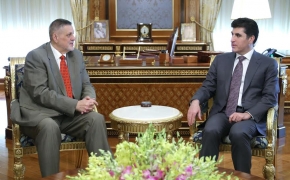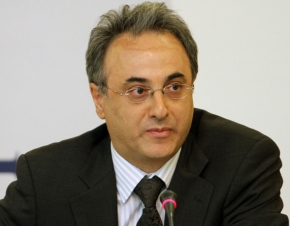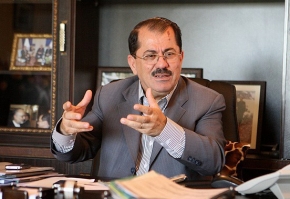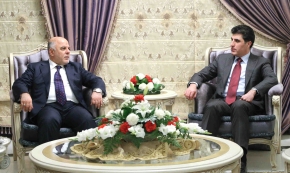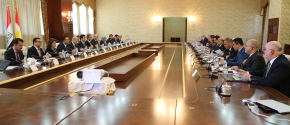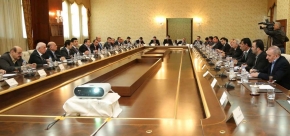Erbil, Kurdistan Region, Iraq (cabinet.gov.krd) - Kurdistan Region Prime Minister yesterday received United Nations Special Representative for Iraq, Ján Kubiš and his accompanying delegation.
The meeting focused on the agreement, signed last December, between Kurdistan Regional Government, KRG, and the Federal Government of Iraq on oil export and budget, as well as Iraq’s 2015 Budget Law. It highlighted Kurdistan Region’s commitment to the agreement.
Prime Minister Barzani expressed his concern for the fact that the Federal Government of Iraq has not been honouring its commitment to the agreement with Kurdistan Region.
He pointed out that the agreement was reached following appeal and support from United Nations, United States and United Kingdom. He urged the three sides to play their role and urge Baghdad to meet its obligations under the agreement and the Budget Law.
In another part of the meeting, the two sides emphasised on further cooperation between United Nation agencies and Kurdistan Regional Government, particularly in dealing with possible increase in numbers of internally displaced people.
They reaffirmed the necessity of further commitment of the international community in assisting Kurdistan Region relevant institutions and United Nations agencies, particularly those which work in humanitarian fields.
The two sides also discussed the latest developments in Iraq, the situation in Anbar Province, and the security situation in the region in general.
Mohammad Seddigh Ahmed (Jegarkhwein) the deputy-representative of Kurdistan Region of Iraq in Tehran, on the occasion of Fuad Masum’s first travel as the president of Iraq to Tehran, gave a note to Taadol Press as followed:
During recent years, Iran and Iraq as two important neighbor countries in the Middle East have had broadly progressing relations. Meanwhile this travel had more positive outcomes so that Masum’s travel can be considered according to this. The importance of mutual relations and political meetings, concerning the general view of regional crises and the increase of tension in the Middle East have turned out to be more than ever. During last year the emergence of new version radical-terrorist group, ISIS, has caused Iran, Iraq and Kurdistan Region’s relations entered a new stage and period which leads to collaborate and cooperate more broadly and effectively as compared to before. Indeed it must be insisted that since the new government has gained the authority and Maliki, whose mismanagement caused Iraq more critical and ISIS more powerful, has resigned, the balanced and cooperative approach with Iran has been clear more than ever.
Ultimately Ahmed, after having mentioned economic, security, culture and political issues, summed up his discussion in a way that the progress of relations between Tehran, Baghdad and Erbil can be deemed more positive and closer than before if all three sides support the current political trend in Iraq according to the correct understanding of facts and present conditions as well as insist on democratic standards and norms to solve and transit these critical and special situations on the basis of establishment of peace and security in the region and save of the regional nations from the threat of greatly and destructively tribal wars and unlimited violent and homelessness of millions people.
The representative of Kurdistan Region in the talk with Mehr news Agency began to describe the message of the travel of the chairman of the Parliament of Iran and analyzed the details of the Baghdad-Erbil agreement and the last position of Kubani.
In a response to a question Nazem Dabbagh said that Larijani’s travel at this time included that I.R. of Iran always had an active presence in any conditions especially when danger threats the people of the Region. This travel insisted this point that Iraq is a country composed of Arabs and Kurds and this does not matter to Iran, thus Larijani traveled both to Baghdad and Kurdistan Region of Iraq.
About the relations of KRG of Iraq with Turkey following the recent changes Dabbagh said: the geographical fact of Kurdistan region of Iraq requires that Erbil have relations with all the neighboring countries. One of those countries is Turkey whose relations have to be according to the preserve of bilateral interests and to constitute of the policy of KRG and Central Government of Baghdad. Inasmuch as there is a policy which is against the interests of the whole Iraq and KRG it will be failed.
The representative of KRG of Iraq in a response to another question concerning the recent Baghdad-Erbil agreement said this agreement is being considered positive and it was the primary and we hope it will be performed in the future. According to this agreement the KRG of Iraq export 300 thousands oil barrel from Kirkuk and 250 thousands from other parts of the Region every day. Instead 17% of the following year of Iraq is assigned to Kurdistan. In addition Iraq government has devoted $1 billion dollars for Pishmerga forces. This is the first time that the expenditure of Pishmerga forces is formally undertaken by Iraq government.
Furthermore about the position of Kubani he said before we were afraid of Kubani to fall but now the security position of the town is getting better day by day and recently the municipal of Kubani has got released from ISIS’s occupation. Now, 85% of Kubani is under the control of Pishmerga. Concerning the position of Shingal in Iraq I should say that in this region we witness the daily fighting between Pishmerga forces and ISIS. Resistance is continuing and we are hoping this region get purified from terrorists of ISIS fully.
Erbil, Kurdistan Region, Iraq, (gov.krd) – A Kurdistan Regional Government senior delegation, headed by Prime Minister Nechirvan Barzani was received in Baghdad yesterday by Iraq’s Prime Minister Haider al-Abadi and a number of Iraq’s federal government officials. The two sides held two meetings during this one day visit of the Kurdistan Region delegation to Baghdad.
The main objective of the meetings was to discuss the implementation of the agreement reached last December between the Kurdistan Regional Government and the Federal Government of Iraq on oil export and budgetary issues.
During the meeting, it became apparent that due to the financial crisis in Iraq and the lack of liquidity, the Iraqi government is unable to pay the Kurdistan Region’s share of January and February from the federal budget.
The two sides agreed to continue holding further talks in order to find an appropriate solution to the situation.
Regarding the implementation of the December agreement, the Kurdistan Regional Government delegation presented a timetable for the export of oil from the Kurdistan Region, which was accepted by the Federal Government of Iraq. Both sides reaffirmed their commitment to the agreement, while working to settle the immediate problem facing the agreement due to the financial crisis that affects whole of Iraq.
The two sides also discussed the latest developments in Iraq, the war against the Islamic State terrorist organization, ISIS, and the importance of coordination between the Peshmerga forces and the Iraqi Army in the fight against terrorism.
In his visit to Baghdad, Prime Minister Barzani was accompanied by Deputy Prime Minister, Qubad Talabani, the Chief of Staff to President of the Kurdistan Region, Dr. Fuad Hussein, Minister of Natural Resources, Ashti Hawrami, Minister of Planning, Ali Sindi, Minister of Finance and Economy, Rebaz Muhammad and KRG spokesperson, Minister Safeen Dizayee.
Erbil, Kurdistan Region, Iraq, (gov.krd) - Kurdistan Regional Government senior officials and Kurdistan Region’s team in Baghdad yesterday held a meeting at the Council of Ministers building in Erbil.
The Kurdistan Regional Government officials presented a comprehensive clarification on the agreement reached between Kurdistan Regional Government and the federal Iraqi government last December on oil export and budgetary issues.
They reaffirmed KRG’s commitment to honour this agreement which became law in 2015’s federal budget.
The Kurdistan Regional Government officials explained the technical constraints which affects the implementation of the agreement as well as a misunderstanding of some terms of the agreement which the Kurdistan Regional Government is working closely with the Federal Government of Iraq to overcome these obstacles and resolve the issues.
They added that there are also some political sides in Iraq that are trying hard to hamper any improvement occur in relations between the Kurdistan Regional Government and the Federal Government of Iraq.
The role of the Kurdish representatives in the Iraqi parliament and government in ensuring that both sides are committed to the implementation of the agreement between Baghdad and Erbil was highlighted and praised.
In the meeting, Kurdistan Region Prime Minister, Nechirvan Barzani, stated that he was ready to visit Baghdad again in order to find common ground and overcome technical obstacles and misunderstandings.
In this regard he instructed a group of Kurdish ministers in the Federal Government of Iraq to open frank discussions with Iraqi Prime Minister, Haider al-Abadi.
The attendees stressed the importance of the implementation and compliance with the 2015 federal Iraqi budget. The Kurdistan Regional Government officials stated that they request the Iraqi government to deal with the Kurdistan Region and its share in line with what was agreed in this year’s federal budget.
More than one plan on how to pay the salaries of Peshmerga and civil servants were also discussed. They stressed that KRG’s current priority is the provision of salaries for its employees.
It was also decided to hold regular meetings every two months. A committee in charge of coordination between the two sides was formed.
Erbil, Kurdistan Region, Iraq, (gov.krd) - Kurdistan Region Prime Minister, Nechirvan Barzani told the press that Kurdistan Regional Government is committed to the agreement reached between Erbil and Baghdad last December on oil export and Kurdistan Region's share in the 2015 federal budget.
In a meeting held yesterday with representatives of media outlets in Kurdistan Region, Prime Minister Barzani highlighted the technical and political problems and obstacles which stood as impediments to the implementation of the budget law.
Prime Minister Barzani stated that the KRG will exert all its efforts to overcome the problems and obstacles that hamper the implementation of the agreement, adding that the Kurdistan Region’s priority is to resolve the outstanding issues with the federal government and the implementation of 2015 budget law. This is in the interest of the Kurdistan Region and the rest of Iraq.
Prime Minister Barzani said, however, if the Iraqi government was not to honour the agreement, the Kurdistan Region will have no other options but to look elsewhere for solutions. He reaffirmed that the Kurdistan Region has so far honoured its obligations towards Baghdad.
Regarding the Kurdistan Region’s oil policy, the Prime Minister stressed that it is in line with Iraqi federal constitution and that the Kurdistan Region will use all its constitutional rights regarding the oil sector and will not waive its constitutional rights.
He told the press that Baghdad is important for the Kurdistan Region not only in oil field but also in trade, security, military and economic cooperation as well as many other areas, and for this, he is ready to visit Baghdad to find longterm solutions for all the issues.
The meeting with the press was also attended by Deputy Prime Minister, Qubad Talabani, KRG Minister of Natural Resources, Dr Ashti Hawrami, Minister of Culture, Khalid Doski, Minister of Planning, Ali Sindi and the Minister of Finance and Economy, Rebaz Muhammad.
Deputy Prime Minister Talabani highlighted KRG plans on how to address the problems that have emerged as the result of the financial crisis and the war against the Islamic State terrorist organisation, also known as ISIS, in addition to the large numbers of refugees and displaced people who fled ISIS violent repression and took refuge in the Kurdistan Region. He said that the government is confident that the plans to combat these problems will succeed.
The KRG Minister of Natural Resources, Dr Ashti Hawrami briefed the press about the technical aspects of the agreement with the Federal Government of Iraq, reiterating that as stipulated in the agreement, oil is being exported to the Turkish Ceyhan port on a daily basis.
Erbil, Kurdistan Region, Iraq, (KRG.org) – After easing almost a year of financial crisis and terrorism threat, the Kurdistan Region last week hosted the 10th Erbil International Fair attended by 250 companies from 16 countries. In the wake of initial agreement between Erbil and Baghdad to resolve oil export and budgetary issues, and of security advances to halt the ISIS threat, market confidence begins to regain and business continues to progress.
Kurdistan Regional Government Minister of Trade and Industry, Samal Sardar, highlighted the importance of hosting the fair amid current circumstances. He said, “The participation of companies from foreign countries might not be at the level of previous years, but hosting the fair shows that business activities have not stopped and the Kurdistan Region’s security situation is very stable for business.” Minister Samal Sardar stressed that the Region’s economy continues to improve.
The breakthrough agreement between Erbil and Baghdad on resolving outstanding issues has helped to resume and revive business activities in the Region.
Mr. Abdulla Ahmed Abdul-Rahim, supervisor of Erbil International Exhibition told krg.org, “Hosting the fair amid the current situation, especially after the initial agreement between Erbil and Baghdad, shows that Kurdistan can preserve its economic position and successfully manage crises.”
He added, “Erbil International Fair managed to build trust during the last ten years and the KRG has played a key role in developing the venue. The fairground has so far hosted more than 60 exhibitions on various sectors and has greatly benefited the people of Kurdistan.”
Representatives of private sector companies said the economic crisis and terrorist threats adversely affected their plans and caused suspension of some planed activities. However, the situation did not last long, as demonstrated by participation of international companies in various exhibitions.
Mr. Saman Brifkani, Supervisor of Magic Art Advertising Agency told krg.org, “Despite some concerns by some companies there have been various exhibitions by big brands and companies in the Kurdistan Region including Land Rover, Range Rover and BMW in which they showcased their latest products. In addition, various French, American and British franchises in Erbil’s markets and malls have recently launched.
“The breakthrough agreement between Erbil and Baghdad will strengthen trust and support increasing business activities”, he added.
On the sidelines at the fair the Czech Republic Consul General to Erbil, Jaroslav Reif, and a delegation from his country’s ministry of trade and industry discussed their activities in the Region.
The Czech Republic Consul General told krg.org, “Czech companies together with Czech banks implemented major projects in the Kurdistan Region especially in the electricity sector. We want to introduce the Kurdistan Region’s investment market to the Czech Republic and invite European investors to support investment activities in the Region.”
The Czech Republic is among the active investors in the Kurdistan Region’s investment market and has long reiterated its interest to invest in the Region.
Lebanon is among the countries that have not suspended their investment and business activities in the Kurdistan Region.
Mr. Jacques Jean Sarraf, Chairman of the Malia Group which owns various investments in the Region especially in the tourism sector told krg.org “The Lebanese private sector is keen on the Kurdistan Region and they did not suspend their activities in the Region.”
He added that his group is one of the main exporters to the Kurdistan Region and they are working on finding an alternative route for bringing their goods to the Region through air cargo as most of the Syrian and Lebanon border is under the control of the Islamic State terrorist organisation, known as ISIS.
Mr. Sarraf said, “Lebanon has played a significant role in developing the Region’s banking, construction and tourism sectors, and has contributed to the investment in the Kurdistan Region, including in basic and higher education.”
In another development, Britain Business Group Kurdistan was launched on 10 December, 2014 to further collaboration between British companies and companies based in the Kurdistan Region.
During the inaugural ceremony, Mr. Frank Baker, British Ambassador to Iraq, highlighted the Kurdistan Region as a stable and suitable environment for economic and trade activities.
During the ceremony, KRG Spokesperson Minister Safeen Dizayee reaffirmed, “The KRG supports the free market and facilitates foreign investment in the Kurdistan Region.”
Baghdad, Iraq, (KRG.org) - Within three days of arrival in Baghdad, the Kurdistan Regional Government delegation headed by Prime Minister Nechirvan Barzani, concluded an agreement with the Federal Government of Iraq. Prior to leaving Baghdad, back to Erbil yesterday, Prime Minister Barzani spoke with the media about the meetings and results of the negotiations.
The KRG Prime Minister highlighted the meetings of the past two days, saying, “During the past two days we have been here in Baghdad in order to address issues between the Kurdistan Region and Baghdad. We conducted several meetings with the Iraqi Prime Minister, the Oil Minister, and other ministers. Different teams focused on different negotiations. We completed our visit today.”
Speaking about the conduct and atmosphere at the meetings the Prime Minister said, “I would like to say the meetings were generally positive. We saw a real desire by the Iraqi Prime Minister, the Iraqi Oil Minister, and all other ministers in Prime Minister Abadi’s government to resolve important issues with the Kurdistan Region. I want to emphasize and reiterate that our preference from day one was to resolve all issues through dialogue. We preferred this option and believe it is the best option.”
Regarding the agreements, Prime Minister Barzani said, “After the former Iraqi Prime Minister unilaterally cut the share of the Kurdistan Region from the Iraqi budget we have attempted to resolve the issue through dialogue. Fortunately, we reached an agreement with Prime Minister Abadi and his team on a number of issues. We believe the agreement is transparent and serves the interests of both the Kurdistan Region and Baghdad. Both sides came out of these negotiations successfully."
Regarding the details of the meetings, the Prime Minister said, “The agreement is as follows: The KRG will deliver 250,000 barrels of oil per day from oilfields in the Kurdistan Region to Baghdad, and we will assist them in exporting Kirkuk oil. In turn, the Federal Government of Iraq will provide the Kurdistan Region 17 percent share of the federal budget. We emphasized that the amount received in the past was never 17 percent, it was always less.”
On the issue of the Peshmerga forces dues which was one of the main unresolved issues, Prime Minister Barzani said, “Prime Minister Abadi offered his respect and gratitude to the Peshmerga forces, especially in the struggle and sacrifices they have been making on the battlefield fighting against ISIS terrorism. Baghdad agreed to allocate 1 trillion 200 billion Iraqi Dinars for the Peshmerga.”
Prime Minister Barzani explained details of the agreement, saying, “The current agreement is not the final agreement, but we believe it to be a good start. There are other issues we should discuss in the coming period and we hope to reach agreement on them, too. This is a good start for both sides and, hopefully, we will resolve all outstanding problems and obstacles within a period of six months or so.
“I can say that, in general, we are pleased with this agreement and consider it a gain for all parties. Given the problems between Erbil and Baghdad, we can say we have come a long way. What we have seen this time in Baghdad is a desire by the Iraqi Prime Minister to tackle these problems. This encourages us to move forward faster. As I said, our priority is to address and resolve our problems with Baghdad.”
Regarding external pressure, particularly from the United States and other parties on the KRG delegation to reach agreement with Baghdad, the Prime Minister said, “There was no pressure on us. What we have achieved was through the desire of both Baghdad and Erbil to reach a mutually satisfying agreement. The United States, United Kingdom, and the United Nations role is to encourage both sides to negotiate to reach an agreement. They did not interfere in the negotiations and did not exert any pressure, even in the organization of the meetings. As you know, Iraqi Oil Minister Dr. Adil Abdul Mehdi visited Erbil recently and met with Deputy Prime Minister Mr Qubad Talabani and I. We agreed then to visit Baghdad to begin these talks.”
Regarding the amount allocated by the Iraqi Government for the Peshmerga forces, whether it was taken from the Kurdistan Region’s portion of the federal budget, Prime Minister Barzani said, “The amount agreed for the Peshmerga forces will be from outside the Kurdistan Region’s share of the budget, meaning it will not be from the 17 percent allocated to the Kurdistan Region. They agreed the Peshmerga forces are part of the Iraqi defense system. This agreement is very important because after 11 years of negotiations Baghdad agreed to the proposal to allocate a portion of the national defense budget to the Peshmerga forces.”
In response to a question, KRG Deputy Prime Minister Qubad Talabani emphasized, "the agreement reached between the Federal Government of Iraq and the Kurdistan Regional Government works in favor of all sides and I believe that everybody will support this agreement."
Prime Minister Barzani thanked the civil servants, businessmen, and contractors in the Kurdistan Region for their patience with salary and payment delays. He said, "We have already received a payment and are receiving another one. We hope to overcome the issue of public service salaries by January."
Regarding exporting oil from Kirkuk oilfields through the Kurdistan Region’s pipeline, the KRG Prime Minister explained that, practically speaking, Kirkuk oil can flow only through the Kurdistan Region’s pipeline. "We have agreed to export 300 thousand barrels per day. The technical process may start this week."
Prime Minister Barzani also noted, "the process of exporting Kirkuk oil through the Region’s pipeline is in the interest of both the Kurdistan Region and Iraq. He said the Region would not charge the Iraqi federal government for the export. The Region works within the framework of the Constitution of federal Iraq. This gives the Kurdistan Region opportunity to coordinate approaches to oil export and solve issues without stress."
Regarding the oil exported by the Kurdistan Region independently, the Prime Minister said, “We continue to export oil that we have, but we will first use it to meet the Region’s domestic fuel requirements. We will export the rest after meeting domestic demand."
Regarding the agreement between the Kurdistan Region and Baghdad, Prime Minister Barzani explained, "The budget law is for one year. When we came from Erbil we knew that we will not resolve all issues in a meeting or two. We thought our visit called for a strategy to resolve the issues. We have now set the strategy. The agreement we have now concluded will open the door to settle all issues within six months to a year.
“What is important is that we managed to implement two important things. First, the sanctions imposed in Iraq’s general budget law on the Kurdistan Region’s share of the national budget have been removed. Second, we have reached agreement on oil export, the Kurdistan Region’s budget, and the Peshmerga forces’ budget.
"The other issues are article 140 of the Iraqi Constitution, incentives for Peshmerga forces, and other outstanding issues for which a period of time will be decided for their settlement. There will be talks also about what is owed to the Kurdistan Region from the 2014 budget, which is 16 trillion Iraqi dinars, as determined by the Iraq Ministry of Finance. All these issues cannot be solved in one meeting, more meetings are needed."
While emphasizing that all differences cannot be solved in one visit or meeting, Prime Minister Barzani reiterated that the agreement concluded with Baghdad paves the way for resolving the issues within six months to one year.
Regarding project loans and mortgages for citizens, Prime Minister Barzani reiterated his government’s commitment to continue support for loans and mortgages.
Regarding guarantees the Iraqi Government will not cut the Kurdistan Region’s share of the national budget again, the Prime Minister explained, "There are no guarantees that the Iraqi government will not cut the Kurdistan Region’s share of the budget. We should not forget, however, that if they cut our share, we hold a key to their oil export. We do not, however, wish to talk in such language, we hope this language is over. We wish to open a new page and avoid using the language of threats."
Regarding Peshmerga forces participating with the Iraqi army in liberating ISIS-controlled territory, the Prime Minister explained, "The Peshmerga forces are now fighting on a 1,100 kilometer-long frontline. Iraq’s Prime Minister lauded their efforts. In fighting a global terrorist organization, what the Peshmerga forces are achieving is most significant and serves the Kurdistan Region, Iraq, and the whole world."
Regarding the Iraqi government’s commitment to implementing the agreement, the Prime Minister said, "the agreement has been approved by the Iraqi Council of Ministers and it has become a decree. The Iraqi government has expressed its support to the agreement. On our part we are implementing the agreement. In Baghdad, we observed willingness. We would like to take every opportunity to reach a solution that serves both the Kurdistan Region and Iraq. However, to what extent it will actually be implemented, we will have to see that later."
Latest News
- President Erdoğan reaffirms Türkiye’s continued support for Iraq and the Kurdistan Region
- President Nechirvan Barzani’s message on the 126th anniversary of Kurdish journalism
- President Nechirvan Barzani at the Sulaimani Forum: The country must bring us all together
- President Nechirvan Barzani meets with European Union Ambassador
- President Nechirvan Barzani receives French Ambassador
- President Nechirvan Barzani visits Iranian Consulate General to pay respects to victims of Kerman terrorist attack
- President Nechirvan Barzani receives outgoing French Ambassador
- President Nechirvan Barzani condemns terrorist bombings in Iran
- President Nechirvan Barzani meets with US Deputy Secretary of State
- President Nechirvan Barzani’s New Year Address
- KRG Prime Minister Meets with US Deputy Secretary of State
- KRG Prime Minister Engages in Key Talks with UNAMI Chief
- KRG Prime Minister Hosts Diplomats from Iraq and Kurdistan Region
- KRG Prime Minister Meets with the UN’s Secretary-General at COP28
- President Nechirvan Barzani meets with Turkish Ambassador
- KRG Prime Minister Welcomes UK Military Delegation
- President Nechirvan Barzani meets with UK Chief of the Defense Staff’s Senior Middle East Advisor
- KRG Prime Minister Discusses Regional Issues and Domestic Policies in Special Panel
- KRG Prime Minister Meets with Former British Prime Minister
- MEPS Forum in Duhok Highlights Climate Change Among Key Global Challenges
- KRG Prime Minister Meets with United Nations Delegation
- President Nechirvan Barzani and French Ambassador discuss the situation in Iraq and the region
- President Nechirvan Barzani meets with Head of the Independent Strategic Review of UNAMI
- KRG Prime Minister Inaugurates 5th International Trade Fair for Industry and Construction
- KRG Prime Minister Meets Qatar's Consul General
- President Nechirvan Barzani meets with Iraq’s Oil Minister
- KRG Prime Minister Welcomes Cardinal Sako of the Chaldean Catholic Church
- KRG Prime Minister Meets with Iraq's Energy Officials
- KRG Prime Minister Meets with British Ambassador
- President Nechirvan Barzani meets with UK Ambassador to Iraq

